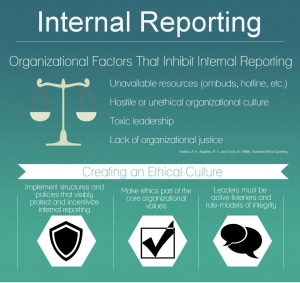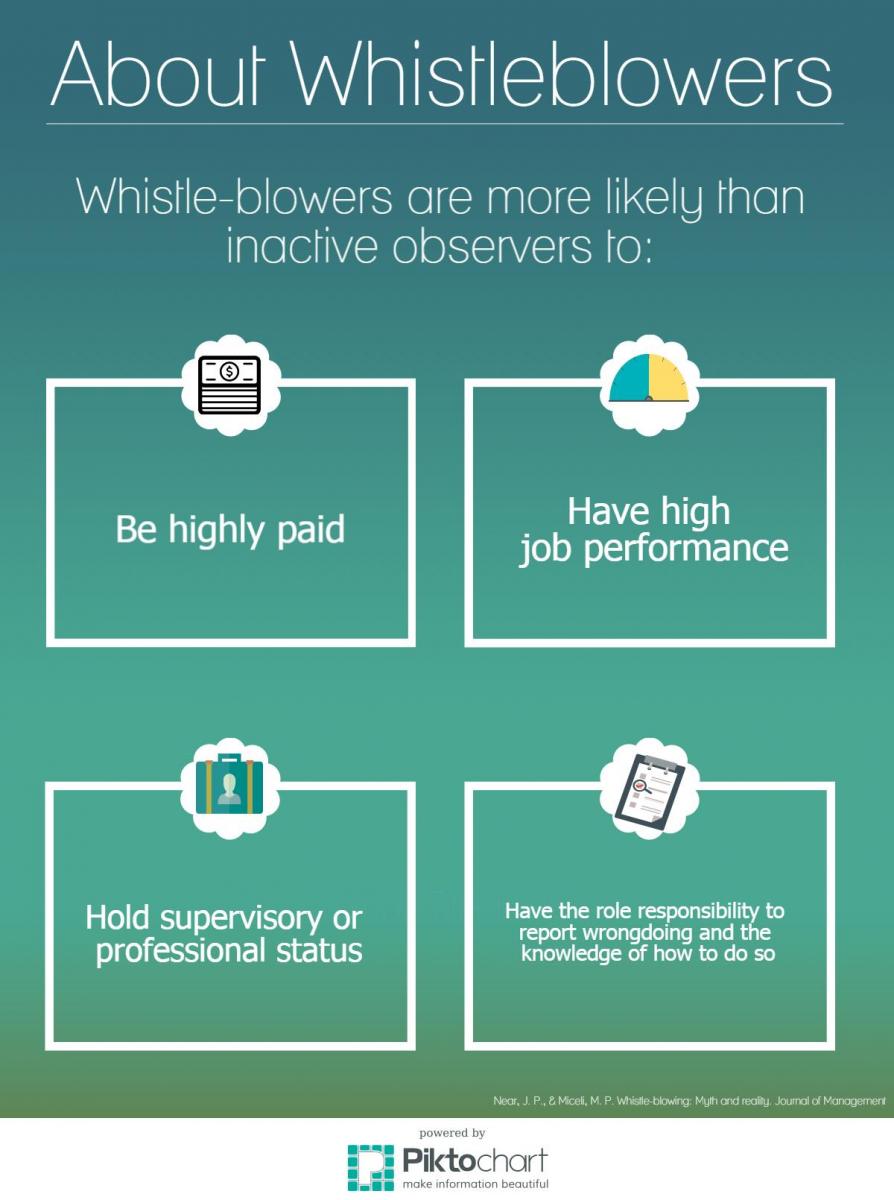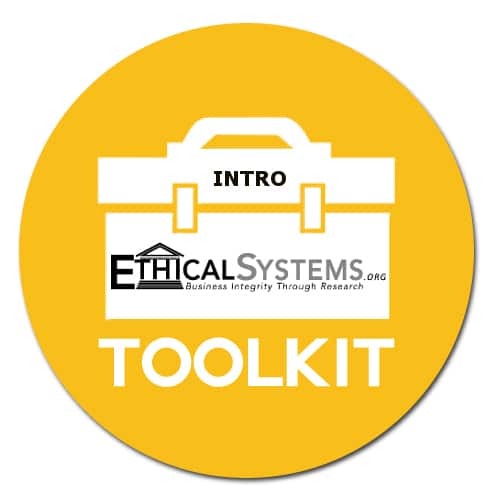A Resource Guide from Ethical Systems

Internal Reporting refers to any time that a member of an organization (or a former member) tells someone else about an illegal or immoral practice, if the telling is done in the hope that someone will do something to change the practice. In the great majority of cases, employees tell someone within the organization and don’t want to cause any bad publicity for the organization—this is sometimes called internal whistle blowing, though we prefer to call this internal reporting.
When organizations punish or discourage internal reporting, bad practices typically get worse, until someone—often motivated by conscience—feels they must notify the press, or a government agency. This is known as external whistle blowing, and it can mean serious problems for the organization.
From an Ethical Systems perspective, internal reporting is vital to the health of organizations. Companies that don’t make it easy for their employees to report small problems internally are likely to find themselves facing much larger problems externally. But there’s a common problem in organizations: people who speak up, even internally, are sometimes seen as traitors, or as people who are “not team players.” What can organizations do to overcome this problem and nurture a culture of trust in which everyone feels free to voice concerns?

Ideas to Apply
The organizational context strongly influences the whistle blowing process and experience. These 4 ethical action steps help make internal reporting work:
1. Leadership priorities
- Hire and develop leaders who exhibit ethical behavior and influence ethical cultures
- Leaders, managers and direct supervisors must act as role-models and active listeners to promote speaking up
- Those at all supervisory levels foster a culture of speaking up when they talk about:
- The long-term vs. short-term (link coming soon)
- Stakeholder value (link coming soon)
- How and why ethics pays
- Speaking up is expected and encouraged. Make problems into learning opportunities.
2. Make ethics part of the core organizational values and encourage a culture of integrity
- Establish a code of conduct and incorporate in recruitment materials, employee contracts and internal policies
- Bake the values and code into daily behavior in the organization
- Be sure managers “walk the talk“
3. Create structures and systems that visibly protect and incentivize internal reporting, i.e. speaking truth to power and preventing sanctions
- Be proactive about adhering to new legislative requirements such as Federal Sentencing Guidelines, the U.S. False Claims Act, and Sarbanes-Oxley.
- Institute robust and effective Compliance and Ethics programs

4. Apply a systems approach, including:The individual dimension
A recent study (Heumann, et. al., 2013) develops five differentiating whistleblower typologies, based on goals, motivations and context:
- The Altruist: The conscience of the organization
- The Avenger: Motivated by revenge or retribution
- Organization Man: Speaks up for the economic interests of the company
- The Alarmist: Notorious complainer, always looking for dire consequences, regardless of validity
- The Bounty Hunter: Seeks to make money through qui tam suits
Another study identifies the internal, ethical dilemmas between being loyal to the company and actively seeking justice (Waytz, et. al., 2013).
The organizational dimension
Research has shown (Vadera, et. al., 2009) that the most important factors that influence reporting intentions and behavior include:
- Leadership
- Perceived support
- Organizational justice
- Organizational culture
- Type of organization
- Risk of retaliation
The legal dimension
Laws and rewards, like the SEC Whistleblower Program, can influence the whistleblower’s behavior, the process, and organizations.
- In the financial sector, the number of whistleblower tips received by the SEC has grown more than 20% since 2012. (SEC Annual Report, 2014)
- Further industries to be added shortly.
Research and Resources

Organizations For Whistleblower Protection and Advocacy
Books
- Trevino, L.K. & Nelson, K.A. (2013): Managing Business Ethics: Straight Talk about How to Do It Right. 6th Edition. Wiley.
- Heffernan, M. (2011). Willful Blindness: Why We Ignore the Obvious at Our Peril. Walker & Company.
- Miceli, M., Near, J.P., Dworkin, T.M. (2008) Whistle Blowing in Organizations
- Alford, C. F. (2001). Broken Lives and Powerful Organizations. Cornell University Press: Ithaca NY.
- Glazer, M. P. and Glazer P. (1989). The Whistleblowers. Basic Books: New York.
Journal Articles
- Wellman, N., Mayer, D. M., Ong, M., & DeRue, D. S. (2016). When are Do-Gooders Treated Badly? Legitimate Power, Role Expectations, and Reactions to Moral Objection in Organizations. Journal of Applied Psychology. [PDF]
- Dungan, J., Waytz, A. and Young, L., (2015). The Psychology of Whistleblowing. Current Opinion in Psychology, August 2015.
- Dalton & Radtke, 2013. The Joint Effects of Machiavellianism and Ethical Environment on Whistle-Blowing. Journal of Business Ethics, 117 (1), 153-172.
- Heumann, M., Friedes, A., Cassak, L., and Wright, W. (2013). The World of Whistleblowing: From the altruist to the avenger, Public Integrity. Winter 2013-2014 (16), pp. 25-51.
- Mesmer-Magnus, J.R. & Viswesvaran, C. 2005. Whistleblowing in organizations: An examination of correlates of whistleblowing intentions, actions, and retaliation. Journal of Business Ethics, 62, 277-297.
- More available on our Internal Reporting Literature Review page
Newspapers and Magazines
- Harvard Business Review (David Mayer. September 2016): Why Are Some Whistleblowers Vilified and Others Celebrated?
- Harvard Business Review (James R. Detert and Ethan R. Burris. Jan/Feb 2016): Can Your Employees Really Speak Freely?
- Rolling Stone (Matt Taibbi. February 18, 2015): A Whistleblower’s Horror Story
- The Wall Street Journal (Lucy Burton. February 12, 2015): What J.P. Morgan’s ‘Worst Nightmare’ Thinks About Whistle Blowing
- Washington Post (Paul Rauwolf, Dominic Mitchell. January 23, 2015): Why are there so few Whistleblowers? Blame Evolution.
- The New York Times (P.J. Henning. December 1, 2014) Tattletales Embraced as Whistle-Blower Programs Gain Support.
- More available on our Internal Reporting Literature Review page
Videos
- Whistleblowers share their experiences
- The Untouchables. Frontline (2013, January 22)
- Zimbardo and Ellsberg
- Dare to Disagree, Ted Talk Margaret Heffernan
Case Studies
- “Enron’s Demise”
- “Lehman Brothers and Repo 105”
- Additional case studies available at www.caseplace.org; search for “whistle-blowing.”
Downloadable Toolkits

Further Learning

This collection of references and resources was created by Ethical Systems at the NYU Stern School of Business. This content is used by permission of Ethical Systems.



Recent Comments